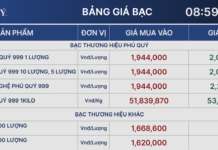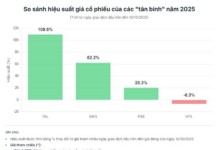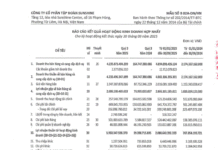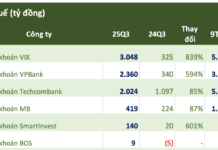
Will “Sell in May” take hold? Photo: Tuan Tran
|
Will “Sell in May” materialize?
Mrs. Nguyen Thi Thuy Linh – Director of Analysis and Investment, An Binh Securities Company (ABS) – commented that the stock market has had a significant recovery in the early months of 2024, surpassing the medium-term peak reached in late September 2023 in the first half of April. Therefore, the market has undergone a sharp correction after increasing sufficiently in terms of time and range.
At the end of April, the VN-Index fell by nearly 6% compared to the previous month – down to 1,209.5 points, after surpassing the previous peak of 1,255 points in September 2023.
The correction occurred in line with the increase in the USD/VND exchange rate, the rise in gold prices, and the lack of signs of cooling inflation in the US, while the Fed has not cut interest rates as analysts had predicted.
In May, the “Sell in May” effect typically occurs because the market enters a period with relatively little news, since most companies have announced their Q1 business results and full-year plans at their general meetings of shareholders – which had already been reflected in the prices.
In addition, in the US, the DJI index is also experiencing a short-term correction amid high US Treasury bond yields and the strength of the US dollar index (DXY). If this situation becomes a medium-term correction, it could negatively impact Vietnam’s stock market.
However, the ABS expert does not highly value the possibility of Sell in May occurring this year due to several factors:
Firstly, although bank interest rates have shown signs of increasing again, they remain at record lows, helping to improve corporate profits and maintaining the market’s attractiveness to investors.
Secondly, the market has corrected sharply in April and is striving to rebalance.
Lastly, the Israel-Iran conflict is under control, global gold prices have fallen, and the State Bank of Vietnam’s (SBV) moves to sell foreign currency and gold into the market have helped cool down the exchange rate and domestic gold prices.
Despite this, the stock market has not yet entered a real growth phase. Technically, the VN-Index has been creating a sideways price range of 200-240-260 points since 2023. Therefore, in the short term, corrective movements could occur with a wide range, especially for stocks that lack supporting fundamentals.
Based on the overall analysis, ABS Reseach predicts that the VN-Index will fluctuate within the range of 1,130 to 1,250 points in May. Investors can expect the market to form a short-term bottom, with brief upswings; however, this will be a challenging period for trading.
Mr. Nguyen Thanh Lam – Director of Research and Analysis, Personal Banking, Maybank Investment Bank believes that the market will be more balanced in May compared to the sharp correction in April. However, May is also a period of information gap, so the balancing and recovery process will be slow, and profit-taking pressure cannot be ruled out in the early part of May.
Regarding the lowest point of the VN-Index, the price could test the previous bottom area of 1,170 points, and the highest point in May is expected to be around 1,235 points.
Speaking about the “Sell in May” effect, Mr. Lam stated that this effect does exist in the stock market. According to statistics from 2010 to the present, the average performance in May is -0.5%, which is low compared to other months of the year. The expert believes that the “Sell in May” effect will likely continue to impact the market this year. This phenomenon often occurs because May is usually a period with little news, as Q1 business results have already been announced, and the peak season for shareholder meetings is typically in April.
Securities will be volatile if exchange rates escalate
Answering the question about the impact of exchange rates on securities in the current context of a strong exchange rate, Ms. Linh stated that high inflation in the US and the Fed’s delay in cutting interest rates, while domestic interest rates have fallen to record lows, have resulted in a high difference between USD and VND interest rates, leading to capital flows from the Vietnamese market to USD assets. As a result, the exchange rate has been rising since late February 2024, and after exceeding a 3% increase since the beginning of the year, it will put pressure on the SBV’s management.
The stock market is usually very sensitive to fluctuations in exchange rates. Recently, the SBV has taken steps to sell foreign currency and gold to cool down the exchange rate and gold prices. However, if the exchange rate continues to escalate, it could lead to unusual ups and downs in the market in the near future.
On the other hand, Mr. Lam believes that if the exchange rate does not cool down, the government will have to try to balance the goal of stabilizing the exchange rate with keeping interest rates low. Mr. Lam believes that there may be a slight increase in interest rates, but it is important to note that interest rates are currently at record lows, and therefore a moderate increase to balance exchange rate pressures is not a signal of a change in monetary policy.
From that perspective, in the short term, the stock market will remain cautious from a psychological standpoint; however, in the medium to long term, the orientations still create a favorable environment for the market’s upward momentum.
Continued defense
Based on short-term market analysis, Ms. Linh believes that investors need to assess the actual situation in May and June to determine whether the VN-Index has corrected enough to make trading or investment decisions. In the immediate term, investors should choose a defensive position and trade with a short-term horizon until medium-term buy signals emerge.
The ABS Analysis Director highlighted that the industry groups with a positive outlook for 2024 will be those that benefit from government policies, macroeconomic conditions, commodity prices, growth cycles, or have their own unique stories…
Industries forecasted to deliver higher-than-market business results in 2024 include: securities, banking, retail, industrial real estate, rubber, construction materials, exports (seafood, construction stone…), technology – telecommunications…
Mr. Lam believes that investors should remain cautious as May is a period of information gap, and it will take more time for market sentiment to “feel stable” if there are any further slight increases in interest rates. Therefore, a strategy that leans towards defense will still be the appropriate choice.
Looking at the medium to long term until the end of this year and the first half of next year, the bigger picture will show more promise, particularly stories related to the stronger recovery of the economy and listed companies, as well as the goal of upgrading the market. These factors will ensure the market’s medium to long-term momentum in the coming period.
For the end of 2024, the Maybank expert is particularly interested in industry groups such as: technology, retail, securities, and banking.
“Upgrading the market will certainly remain an important driver, not only for the securities sector but for the entire market in general over the next 1-2 years” – Mr. Lam predicted.


































